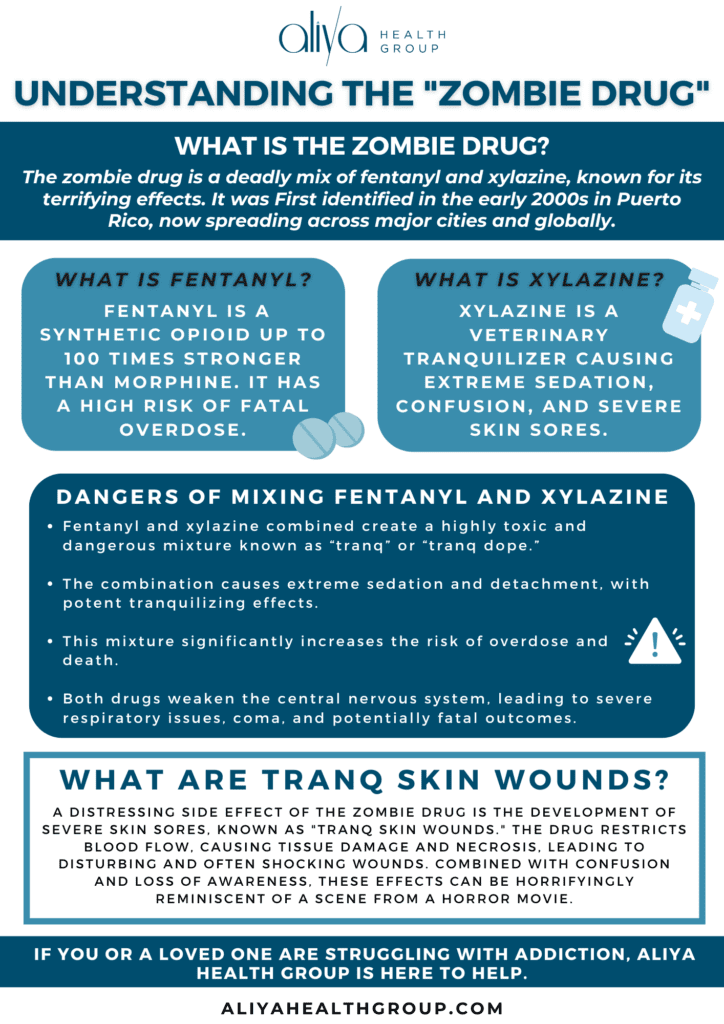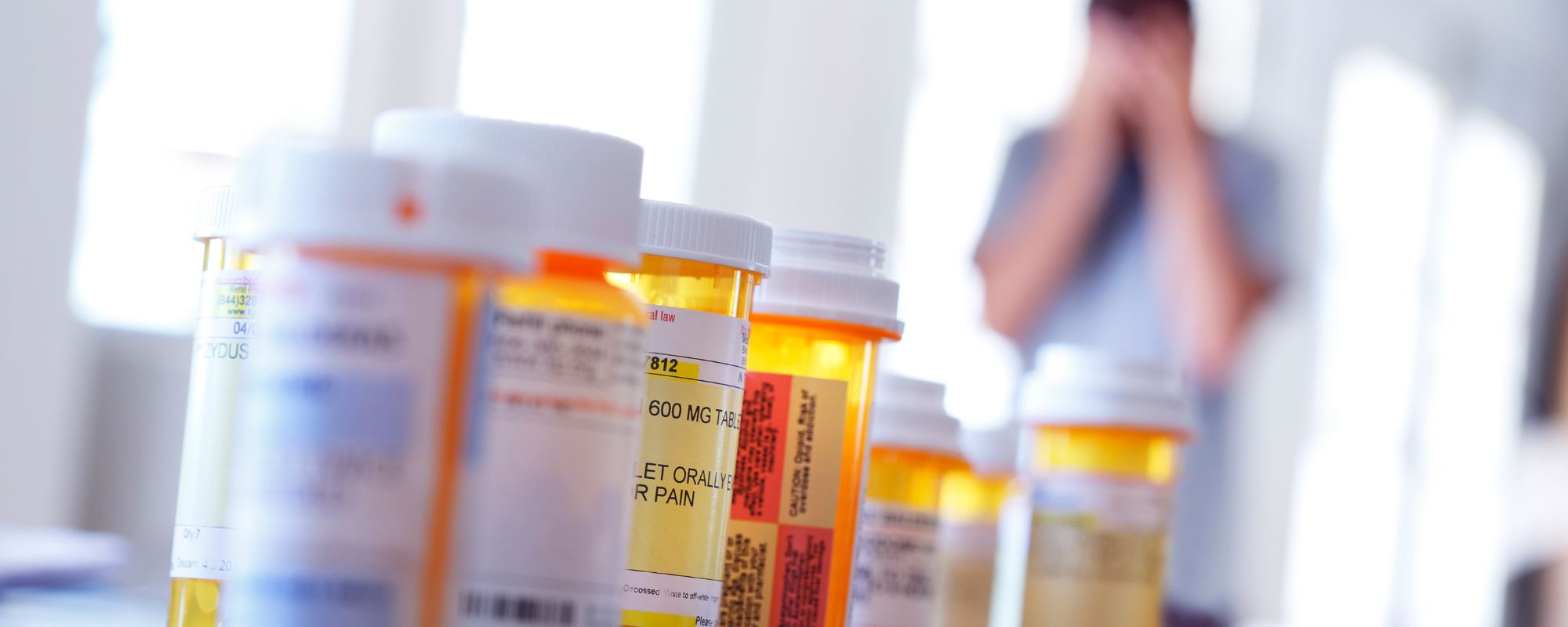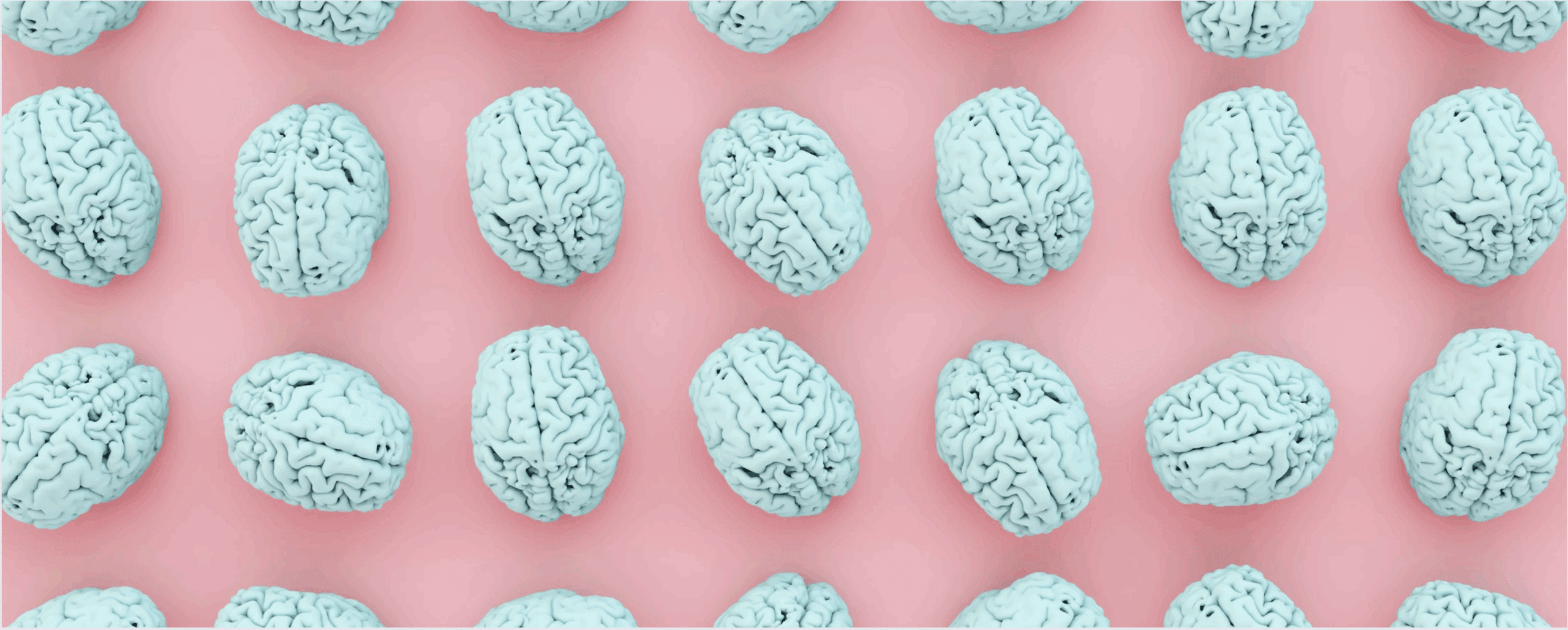In the world of illegal drug use, dangerous new mixtures pop up all the time. One of the more recent substances, dubbed the “zombie drug,” has been making headlines for its terrifying effects and for being a headache for law enforcement. But what is this illicit drug, and why should you be careful?
What Is the Zombie Drug?
The “zombie drug” name may sound like something out of a horror movie, but its reality is far scarier. At its core, the zombie drug is a deadly cocktail made of two potent substances: fentanyl mixed with the drug xylazine.
While its exact origins aren’t known, it was first detected by drug authorities in the early 2000s in Puerto Rico, where users coined it “Flakka.” Zombie drugs began surfacing more recently in larger metropolitan environments, including Los Angeles, before spreading to Europe and beyond. the U.S. Drug Enforcement Administration issued an alert in 2023 warning of a “sharp increase in the trafficking of fentanyl mixed with xylazine, which is also known as ‘tranq’ or ‘tranq’ dope.’”
Individually, both fentanyl and xylazine are powerful drugs with their own set of risks and side effects. Fentanyl, a synthetic opioid, is a main player in the opioid crisis gripping nations worldwide. Renowned for its extreme potency, fentanyl is estimated to be up to 100 times stronger than morphine. It was initially intended for medical use in managing severe pain. These days, it’s illegally produced, often mixed with other drugs, and distributed on the street. Fentanyl’s strength puts users at risk of overdose, often with fatal consequences.
Xylazine comes from veterinary medicine. It’s used to calm down large animals like horses and cattle. Today, xylazine is added to illegal substances to lengthen euphoric effects.
When combined, fentanyl and xylazine create a toxic brew that causes extreme sedation and detachment. This combination is often referred to as “tranq” or “tranq dope,” due to its tranquilizing effects. The interaction between these two substances increases their risks, including potential overdose and death. The zombie drug xylazine’s effects on users include, among other things, exhaustion, confusion, and a loss of awareness.
Why Is Mixing Fentanyl and Xylazine Dangerous?
The combination of xylazine and fentanyl is extremely dangerous. Beyond its immediate tranquilizing effects on the brain, the zombie drug has a severely negative impact on the physical well-being of its users. Both fentanyl and xylazine weaken the central nervous system, resulting in respiratory problems, coma, and even death.
One particularly distressing side effect of using the zombie drug is the development of severe skin sores and wounds, commonly referred to as “tranq skin wounds.” The drug stops blood flow to the skin, causing tissue damage and necrosis (also known as rotting skin”). The sight and, potentially, smell of individuals who have fentanyl and xylazine wounds is very disturbing. Combined with the confusion and loss of awareness, one could easily believe they’ve entered the Night of the Living Dead.
Who Can Help with Tranq Addiction?
People on tranq are urged to seek drug counseling and treatment from qualified addiction professionals. Overcoming tranq zombie drug addiction requires a comprehensive approach that encompasses professional treatment, peer support, and community resources.
Drug addiction treatment centers provide a safe and supportive environment with the guidance of experienced medical professionals. From detoxification services for xylazine withdrawal to therapy and group support, treatment can be customized to address the unique needs of each individual.
Beyond formal treatment settings, community and peer support play an important role in the recovery journey as well. Peer support groups such as Narcotics Anonymous (NA) provide a supportive and non-judgmental environment to share experiences, seek guidance, and draw strength. By fostering a sense of belonging, these support networks serve as a source of inspiration and motivation.
Get confidential help from our addiction and mental health treatment facilities located across the United States. Call to join one of our quality programs today!
Speak With Our Admissions Team
Opioid Drug Treatment Options
Treatment centers offer a range of programs designed to support individuals on the path to recovery from opioid addiction.
Evidence-Based Therapy
Evidence-based psychotherapy is a proven practice for overcoming opioid addiction. Some of the most common evidence-based therapies for addiction to opioids like tranq include:
- Medication-assisted treatment (MAT): MAT is when clinical professionals use medication to help someone recover from opioid abuse. For those addicted to the zombie drug, medications such as methadone, buprenorphine, and naltrexone help reduce cravings for the drug, reduce the severity of fentanyl and xylazine withdrawal symptoms during detox, and reduce the risk of relapse.
- Cognitive-Behavioral Therapy (CBT): CBT helps opioid users change negative behaviors and thought patterns associated with substance abuse. It helps someone build coping skills and strategies for dealing with triggers and cravings.
- Dialectical Behavior Therapy (DBT): DBT blends elements of CBT with mindfulness to help someone develop emotion-regulation techniques and interpersonal effectiveness skills.
- Motivational Interviewing (MI): This counseling approach is all about exploring and resolving ambivalence about changing drug-use behaviors.
- Trauma-Informed Therapy: It’s common for those with an opioid addiction to have experienced trauma at some point. Trauma-sensitive practices are added to treatment to promote safety, empowerment, and healing.
- Holistic Therapy: Holistic practices like yoga, art therapy, and adventure therapy take the mind, body, and soul into account for more well-rounded treatment.
- Aftercare: Access to resources, support services, and relapse-prevention strategies help those in recovery stay on track. Peer support groups such as SMART Recovery and 12-step programs like NA are also invaluable to the recovery journey.
Looking for quality treatment for substance abuse and mental health that’s also affordable? Aliya Health Group's treatment facilities accept most major insurance providers. Get a free insurance benefits check now!
Check Your CoverageOpioid Addiction Treatment at Aliya Health Group
Aliya Health Group is a nationwide network of alcohol and drug addiction treatment centers that offers evidence-based programs for opioid use disorders. Our highly personalized clinical approach and full continuum of care give you the tools you need to build a drug-free life.
Our opioid addiction treatment programs are rooted in dignity and compassion for all. We utilize treatments like dual diagnosis to aid in treating both addiction and mental illness. Our unique levels of care for opioid addiction treatment include:
- Medical Detox Program
- Residential Treatment Program (inpatient)
- Partial Hospitalization Program (PHP)
- Intensive Outpatient Program (IOP)
If you or someone you know needs opioid treatment or xylazine dependency treatment, please contact Aliya Health Group today. We’re here to provide support in ending physical dependence on opioid drugs like tranq and reducing the negative impact of xylazine. Treatment can help prevent overdose deaths, improve mental illness and physical health, end a substance use disorder, and improve public health and public safety. If you’re ready for addiction and behavioral health treatment, call us today.















